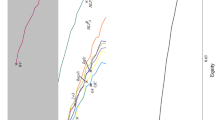Abstract
The impact of the electoral system on the relative importance of various modes of executive–legislative relations is indirect. Through its impact on the distribution of seats in parliament, the electoral system co-determines the number of parties in government, which in turn influences cabinet durability, which is seen as an indicator of government domination over parliament. Through its impact on the cohesion of parliamentary parties, the electoral system may have an effect on party and coalition discipline, and a weakening of such discipline may lead to more assertive members of parliament from governing parties. To the extent that the electoral system favours other foci of representation than party, it may also contribute to weakening party-based modes of executive–legislative relations. Tracing these three indirect effects leads to the conclusion that a Mixed Member Proportional system with multi-member districts as originally proposed by the Dutch government is likely to have had the opposite effect from what was intended. Of the proposals discussed, introducing a more open list system would contribute most to the desired weakening of party-based executive–legislative relations, but may have the unintended effect of strengthening the representation of cross-party sectoral interests.
Similar content being viewed by others
Author information
Authors and Affiliations
Rights and permissions
About this article
Cite this article
Andeweg, R. Towards a Stronger Parliament? Electoral Engineering of Executive–Legislative Relations. Acta Polit 41, 232–248 (2006). https://doi.org/10.1057/palgrave.ap.5500162
Published:
Issue Date:
DOI: https://doi.org/10.1057/palgrave.ap.5500162




